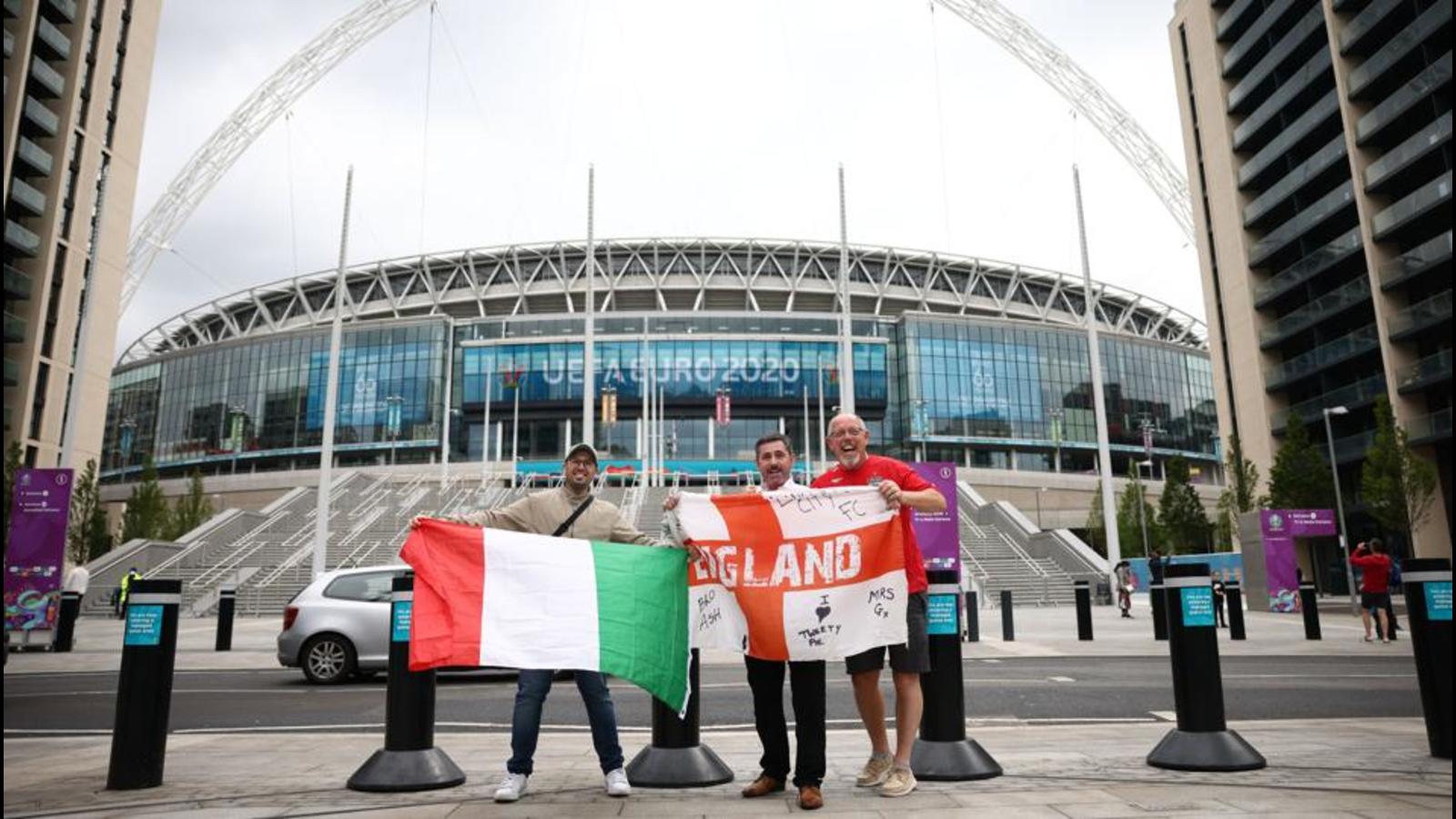It feels like eons ago when Gian Piero Ventura’s team was beaten 1-0 on aggregate by Sweden in a two-leg play-off in November 2017, a result that saw Italy miss out on qualifying for the World Cup for the first time in six decades. Having been knocked out of the group stages in the two previous editions of the World Cup, the Azzurris were looking a shadow of the side that had become world champions, for the fourth time, in 2006.
There are some survivors in the current squad from that fateful night at the San Siro in Milan, most notably the veteran centre-back duo of Giorgio Chiellini and Leonardo Bonucci.
Also read | England fined 30,000 euros for use of laser pointer, booing Denmark anthem
Together, they have played 219 internationals, and were also in the squad that had reached the final of the European Championship in 2012. Since then, a quarter-final in the 2016 Euro was the highest the Azzurris had gone. Until now. As Italy, European champions in 1968, prepare to face England in the Euro 2020 final in London on Sunday, Chiellini said the thought of winning this title had seemed ‘crazy’ at one point.
“It is a dream that we have cultivated in the last three years, we carry it with us. The coach instilled it in our heads until it became reality,” Chiellini said in London on Saturday.
Also read | Euro 2020 final: England’s road to the final
“At the beginning when he said we had to think about winning the European Championship we too thought he was crazy. Instead, we managed to get there and now the last centimetre is missing.”
Roberto Mancini, the architect of Italy’s latest resurgence, has revived the team playing a brand of football the world usually doesn’t associate with Italy. It is perhaps an illustration of the way football has evolved in the Serie A in recent years.
Also read | Euro 2020 final: Italy’s road to the final
Depending on the situation, Mancini’s Italy can control the ball like a Maurizio Sarri side, play high-risk-high-reward football like Gian Piero Gasperini’s Atalanta, mirror Roberto De Zerbi’s set up at Sassuolo, be pragmatic and adaptive like Antonio Conte’s teams or patient like a Massimiliano Allegri side.
This team is a confluence of styles moulded in his own way by Mancini. As the Azzurris have marched into the final, cruising through the group stages and progressing from three tricky knockout fixtures, there haven’t been too many references of catenaccio – the good old Italian way of locking out opposition attacks.
Also read | Euro 2020 final, Italy vs England: Tactical breakdown
Against Belgium and more often in the semi-final against Spain, there were moments when the Italian defence was stretched. But the team has adapted to every situation well, showing game management reminiscent of Marcelo Lippi’s star-studded Italy on way to the 2006 World Cup triumph. With their form in this campaign and a 33-run unbeaten streak that stretches back to 2018, Italy will start Sunday’s final against England as favourites.
However, Gareth Southgate’s England have grown during this tournament and Wembley is their den. In the high-voltage clashes against Germany and Denmark, the atmosphere on the ground did seem to rub off on the players at times, giving England just that added push in tight situations. Italian players though have said they can shut out the noise.
England also know they can match Italy on the field as they have shown time and again throughout this tournament. That England have conceded one goal in Euro 2020, that too from a direct free-kick, is no coincidence. Southgate’s side has changed according to the needs of the opposition of the day and managed to nullify their strengths. So, barring the quarter-final win over Ukraine, England haven’t really had a comfortable ride in any of their games but got the job done every time.
Against Germany, for instance, Southgate played an extra defender for a five-man backline backed up by two holding midfielders. In the semi-final against Denmark, Southgate took the call to replace substitute Jack Grealish in second half extra-time and bring on an extra defender. England managed to kill the game with Denmark having lost a player to injury after having exhausted their substitutions.
Southgate would have known that had anything gone wrong in those games, he would have borne the brunt of the fans’ fury over his decisions. But this is exactly what makes this England side different from its predecessors of the past five decades: the ability to be conservative when needed and react well when necessary, as they did after trailing against Denmark.
The argument against England is that they have been fortunate with the draw. It isn’t entirely wrong. Croatia, their toughest opponents in the group stage, were unimpressive; they played an inconsistent Germany in the round of 16 and neither Ukraine nor Denmark would be among the most formidable quarter-final or semi-final opponents they had expected.
The fact that it needed a controversial penalty in extra-time to get past Denmark also didn’t escape the notice of England’s critics. But when they take the field on Sunday, England will not be fazed by their formidable opponents.
Because despite the sustained lack of international success, England have many players who have played in the biggest of continental games for their clubs. “Of course, Italy have a better history than us in terms of winning tournaments, but a lot of us in our team now have had experience at club level of playing in the biggest games, the biggest finals,” captain Harry Kane told reporters on Friday.
For all the latest Sports News Click Here
For the latest news and updates, follow us on Google News.

